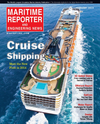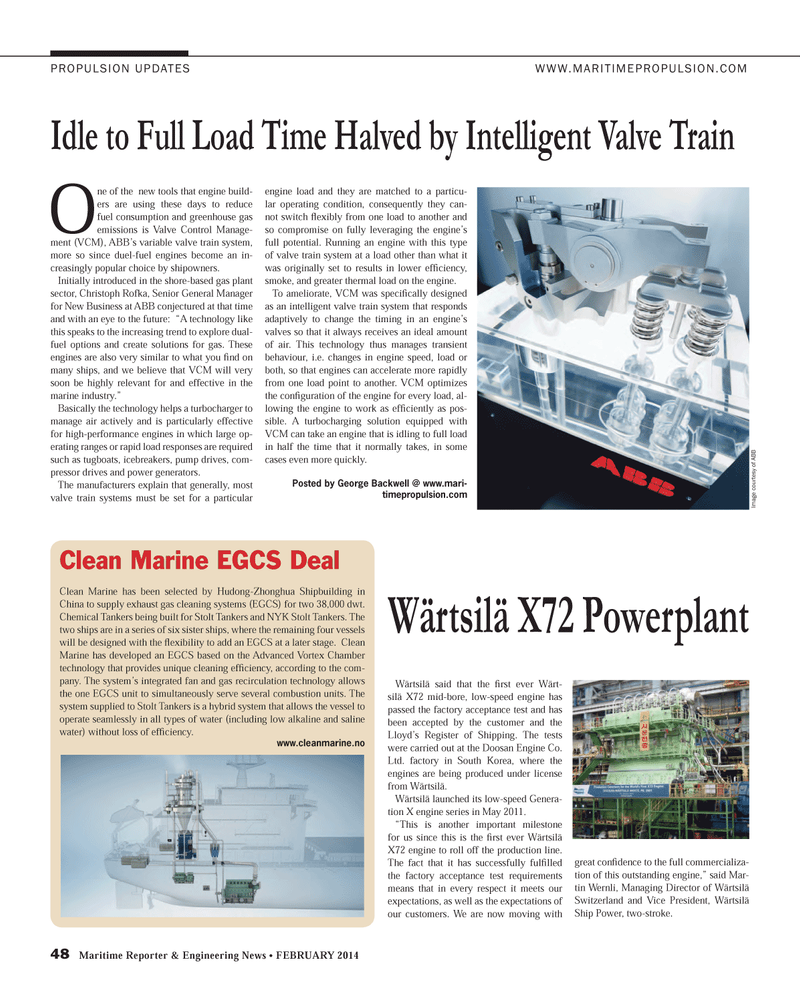
Page 48: of Maritime Reporter Magazine (February 2014)
Cruise Shipping Edition
Read this page in Pdf, Flash or Html5 edition of February 2014 Maritime Reporter Magazine
48 Maritime Reporter & Engineering News • FEBRUARY 2014
PROPULSION UPDATES WWW.MARITIMEPROPULSION.COM
O ne of the new tools that engine build- ers are using these days to reduce fuel consumption and greenhouse gas emissions is Valve Control Manage- ment (VCM), ABB’s variable valve train system, more so since duel-fuel engines become an in- creasingly popular choice by shipowners.
Initially introduced in the shore-based gas plant sector, Christoph Rofka, Senior General Manager for New Business at ABB conjectured at that time and with an eye to the future: “A technology like this speaks to the increasing trend to explore dual- fuel options and create solutions for gas. These engines are also very similar to what you fi nd on many ships, and we believe that VCM will very soon be highly relevant for and effective in the marine industry.”
Basically the technology helps a turbocharger to manage air actively and is particularly effective for high-performance engines in which large op- erating ranges or rapid load responses are required such as tugboats, icebreakers, pump drives, com- pressor drives and power generators.
The manufacturers explain that generally, most valve train systems must be set for a particular engine load and they are matched to a particu- lar operating condition, consequently they can- not switch fl exibly from one load to another and so compromise on fully leveraging the engine’s full potential. Running an engine with this type of valve train system at a load other than what it was originally set to results in lower effi ciency, smoke, and greater thermal load on the engine.
To ameliorate, VCM was specifi cally designed as an intelligent valve train system that responds adaptively to change the timing in an engine’s valves so that it always receives an ideal amount of air. This technology thus manages transient behaviour, i.e. changes in engine speed, load or both, so that engines can accelerate more rapidly from one load point to another. VCM optimizes the confi guration of the engine for every load, al- lowing the engine to work as effi ciently as pos- sible. A turbocharging solution equipped with
VCM can take an engine that is idling to full load in half the time that it normally takes, in some cases even more quickly.
Posted by George Backwell @ www.mari- timepropulsion.com
Idle to Full Load Time Halved by Intelligent Valve Train
Wärtsilä said that the fi rst ever Wärt- silä X72 mid-bore, low-speed engine has passed the factory acceptance test and has been accepted by the customer and the
Lloyd’s Register of Shipping. The tests were carried out at the Doosan Engine Co.
Ltd. factory in South Korea, where the engines are being produced under license from Wärtsilä.
Wärtsilä launched its low-speed Genera- tion X engine series in May 2011. “This is another important milestone for us since this is the fi rst ever Wärtsilä
X72 engine to roll off the production line.
The fact that it has successfully fulfi lled the factory acceptance test requirements means that in every respect it meets our expectations, as well as the expectations of our customers. We are now moving with great confi dence to the full commercializa- tion of this outstanding engine,” said Mar- tin Wernli, Managing Director of Wärtsilä
Switzerland and Vice President, Wärtsilä
Ship Power, two-stroke.
Clean Marine EGCS Deal
Clean Marine has been selected by Hudong-Zhonghua Shipbuilding in
China to supply exhaust gas cleaning systems (EGCS) for two 38,000 dwt.
Chemical Tankers being built for Stolt Tankers and NYK Stolt Tankers. The two ships are in a series of six sister ships, where the remaining four vessels will be designed with the fl exibility to add an EGCS at a later stage. Clean
Marine has developed an EGCS based on the Advanced Vortex Chamber technology that provides unique cleaning effi ciency, according to the com- pany. The system’s integrated fan and gas recirculation technology allows the one EGCS unit to simultaneously serve several combustion units. The system supplied to Stolt Tankers is a hybrid system that allows the vessel to operate seamlessly in all types of water (including low alkaline and saline water) without loss of effi ciency. www.cleanmarine.no
Wärtsilä X72 Powerplant Image cour t esy of ABB
MR #2 (42-49).indd 48 2/4/2014 4:43:51 PM

 47
47

 49
49
